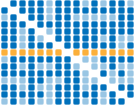Petőfi Sándor: János vitéz (részlet)
János vitéz (részlet) (Hungarian)Tüzesen süt le a nyári nap sugára Szerelem tüze ég fiatal szivében, Tenger virág nyílik tarkán körülötte. De nem ám a patak csillámló habjára, Kisleány szoknyája térdig föl van hajtva, Mert a pázsit fölött heverésző juhász „Szivemnek gyöngyháza, lelkem Iluskája!” Vesd reám sugarát kökényszemeidnek, „Tudod, Jancsi szivem, örömest kimennék, Ezeket mondotta szőke szép Iluska, „Gyere ki, galambom! gyere ki, gerlicém! Kicsalta a leányt édes beszédével,
|
John the Valiant (detail) (English)The blistering sun in the midsummer sky With fiery young love his heart is blazing. A sea of bright flowers spreads wide around him, And it isn’t fixed on the brook’s bright swirl, Up over her knees her skirt is hooked Yes, the shepherd lolling there in the grass „Iluska - Nelly - my dear heart’s pearl!” „Smile up at me with your sloe-eyed look, „I’d gladly come out, Johnny dear, you know, The beautiful Nell answered him with a smile, „Come out, my dove! come up, my pigeon! With his blandishments he coaxed her out,
|
||||||||||





